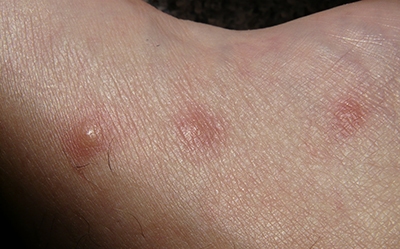Drug Allergies
Some can be life threatening
| Download this episode | Almost everybody is allergic to something, whether it’s a type of food or a seasonal item like tree pollen. But not all allergies result in sneezing or watery eyes. Some can be life-threatening. A drug allergy occurs when the body’s immune system reacts adversely to a medication. A number of drugs can cause a drug allergy, including prescription and over-the-counter medications. Antibiotics most commonly cause allergic reactions. Women appear to have an increased risk for adverse drug reactions. The most common signs of a drug allergy are hives, rash or fever. You can even have an allergic reaction to a drug though it caused no noticeable reaction in the past. Most drug-related symptoms are not a true drug allergy and don’t involve the immune system. Allergic and non-allergic drug reactions are often confused because they can cause similar symptoms. Either type is called an adverse drug event and needs to be checked by a doctor. | Many allergic reactions start immediately after taking a drug. However, it’s possible to develop an allergic reaction to a medication after you’ve taken it for up to several weeks. The most common symptoms of a drug allergy include a skin rash, hives, fever, facial swelling, shortness of breath and dizziness. A rare but serious allergic reaction is anaphylaxis, which involves tightening of the airway, causing trouble breathing, as well as nausea or diarrhea. Anaphylaxis can also cause a weak pulse and even loss of consciousness. When someone has an allergic reaction to a drug, their immune system responds to the drug as a harmful invader. This causes the release of histamine and other chemicals that cause allergic symptoms. Your immune system then becomes keyed to react the same way if you take the drug again in the future. However, the immune system changes over time, and eventually it’s possible your allergy may go away on its own. | Did you know that it’s possible to have sensitivity to aspirin? In fact, aspirin can cause a severe asthma attack, especially in people who have asthma or sinus problems. Reactions to aspirin are often related to the drug itself, however, rather than to an allergic or immunological response to the drug. Signs of aspirin sensitivity, which usually occur within a few hours of taking the medication, can range from mild to serious. The symptoms of aspirin sensitivity may include a runny nose, swelling of the lips, tongue or face and coughing, wheezing or shortness of breath. If you’ve had a reaction to aspirin, avoid all forms of aspirin. It’s also best to avoid other nonsteroidal anti-inflammatory drugs as well, including ibuprofen and naproxen. Keep in mind that aspirin and other NSAIDs are found in many over-the-counter medications, so check labels carefully. If you think you might have an aspirin sensitivity, consult a doctor or allergist for advice. | Drug allergies are diagnosed by a careful review of the patient’s medical history and symptoms. If an allergy to an antibiotic such as penicillin is suspected, your doctor may do a skin test to confirm the allergy. However, skin testing does not work on all drugs and in some cases could be dangerous. Because of the potential risk associated with a reaction, if a patient has had a severe reaction to a particular drug, doctors will not consider that drug a viable treatment option, and will not usually conduct tests to determine if the initial reaction was a “true” allergic response. A number of factors influence your chances of having an adverse reaction to a medication, including body size or the presence of an underlying disease. Also, having an allergy to one drug predisposes one to have an allergy to another unrelated drug. But contrary to popular myth, a family history of a reaction to a specific drug does not increase your chance of reacting to the same drug. | When it comes to treating a drug allergy, the best method is simply avoiding the medication. You may also need medications to ease the symptoms. In the case of minor reactions such as hives or a rash, an over-the-counter antihistamine like diphenhydramine may be all that is required. Serious reactions may require treatment with oral or injected corticosteroids at the hospital. You should seek emergency treatment if you have severe rash or hives, swelling, dizziness or other signs or symptoms of a severe reaction. If you have a history of a possible drug allergy, a skin test may help find out for certain. Once you know you have a drug allergy, you’ll need to avoid that drug and related drugs. Tell all of your health care providers, including your dentist, about your drug allergy. In case you’re in an accident, you may want to wear a medical alert ID bracelet so that emergency workers will know about your allergy.
Transcript
Many start immediately
Transcript
Allergic to aspirin
Transcript
A “true” allergic response
Transcript
Avoid the medication
Transcript
